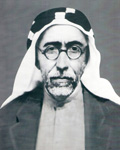|
Ahmad Mohammad Hussain Nassrullah Marafie
1900 – 1956

His Attitude with the British Consul:
Ahmad Marafie is considered one of the business pioneers,
who established commercial relations with Japan, Germany,
Italy, Russia, U.S.A, and Great Britain. Once during World
War II when the British Commissioner visited Ahmad Marafie
in his office in the souk (Souk Aldakhly), he came across
imported goods of textiles, blankets etc., from Japan and
Germany flooded the market. Immediately he remonstrated it
stating that this would lead to the animosity of the British
Crown since the same goods are manufactured in Great Britain
too.
Ahmad Marafie, diplomatically handled the situation. He
boosted the British commissioner’s morale by updating him of
the greatly established long standing mutual business ties
along with their intention of extending wholehearted co-
operation with British factories in the long run since
British goods were found to be acceptable to the customers.
He further referred to the high esteem Kuwaitis held towards
the British government’s sincere co-operation and support
which had been well reflected in people’s enthusiasm to buy
British good due to its exceptionality.
It is said that once when a German ship captain celebrated
the debut arrival of their new ship, brought for seafaring,
with a bottle of Champaign, Ahmad Marafie who was awaiting
the ship at shore became outrageous and hitherto rejected
all business ties with that German Company. Thereafter, the
agency, with all its documents was handed over to Abdurahman
Al-Bahar.
During Sheikh Jaber Al-Ahmad’s reign, he was elected as a
member of the Municipal Council in 1931, by direct ballot.
The job Sheikh Ahmad Al-Jaber offered him, while in his
forties, at the Customs Department of Kuwait Oil Co. was
refused. He was also entrusted the Old Marafie Hussainiya
(Alsharqiya) after his father. In addition to this, he
established the Ja'fariya National School in the year 1938.
1938 Assembly Year (Almajliss):
Though Ahmad Marafie was asked to be part of 1938 assembly,
he refused it. In his perspective, an assembly of the kind
would neither represent the people of Kuwait nor would it be
competent to address the general issues or draw vital
decisions in favour of the nation whose population growth
rate by then multiplied towards the year 1938. Yet he
maintained good terms with Ahmad Al-Jaber, Abdullah Al-Salem
and other assembly advocates. As a feather to his cap, his
approach with feasible solutions over crisis, which
otherwise would have taken a drastic turn with the destiny
of the nation, proved him as a seasoned administrator.
|

